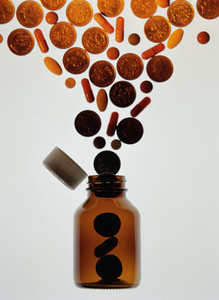A nationwide cohort study in Austria reported that substituting branded medications with drugs containing the same active ingredients (generics) could save considerable amounts of money. A study at the Center for Medical Statistics, Informatics and Intelligent Systems (CeMSIIS) at the Medical University of Vienna, Austria, in cooperation with the Main Association of Austrian Social Security Institutions, has calculated the potential savings from generic medications used in the treatment of common conditions such as hypertension, hyperlipidaemia and diabetes mellitus. The potential annual financial savings for health insurance companies stand at around 18 per cent, equating to tens of millions of Euros [1].
Potential savings of Euros 72 million with more generics use in three therapeutic areas
Generics/Research
|
Posted 13/03/2015
 0
Post your comment
0
Post your comment

The study analysed data collected from 8.3 million people across Austria (equivalent to 98.5 per cent of the entire insured population of Austria) between 2009 and 2012. Three groups of medications – medications that are used to treat conditions that are widespread among the population – were taken into account: drugs against hypertension, hyperlipidaemia (a fat metabolism disease) and diabetes mellitus. In 2012, health insurance companies spent Euros 231.3 million, Euros 77.8 million and Euros 91.9 million on anti-hypertensive, lipid-lowering and diabetes-treating medications, respectively. The calculations show that substituting the medications with cheaper generic versions (same active ingredient, same dose) would have saved Euros 52.2 million (22.6%), Euros 15.9 million (20.5%) and Euros 4.1 million (4.5%) in costs. This amounts to a potential saving of an average of 18 per cent.
Price difference has grown in recent years. A comparison with previous years, looking back to 2009, shows an ever-growing increase in the potential savings. While the difference for anti-hypertensive medications was 15.2 per cent in 2009, this had risen to 22.6 per cent by 2012. Lipid-lowering medications had a potential saving of 9.2 per cent in 2009, rising to 20.5 per cent by 2012. Only diabetes medications experienced a drop, with the potential saving falling from 5.6 per cent to 4.4 per cent.
‘This study showed that substituting high-cost medications for common conditions such as hypertension, hyperlipidaemia and diabetes mellitus with the cheapest medications available on the market with the identical active ingredient and equally good effect can help Austrian health insurance companies to save up to Euros 72 million a year,’ explains Dr Georg Heinze from the Center for Medical Statistics, Informatics and Intelligent Systems (CeMSIIS) at the Medical University of Vienna.
Editor’s comment
Readers interested to learn more about the rational use of medicines in Austria are invited to visit www.gabi-journal.net to view the following manuscript published in GaBI Journal:
Readers interested in contributing a research or perspective paper to GaBI Journal – an independent, peer reviewed academic journal platform – please send us your submission here.
Related Articles
Austria increases dialogue in order to involve physicians more with biosimilars
Austria could save Euros 256 million by using more generics
Reference
1. Heinze G, et al. Potential savings in prescription drug costs for hypertension, hyperlipidemia, and diabetes mellitus by equivalent drug substitution in Austria: a nationwide cohort study. Appl Health Econ Health Policy. 2014 Dec 24. Epub ahead of print. doi:10.1007/s40258-014-0143-4
Permission granted to reproduce for personal and non-commercial use only. All other reproduction, copy or reprinting of all or part of any ‘Content’ found on this website is strictly prohibited without the prior consent of the publisher. Contact the publisher to obtain permission before redistributing.
Copyright – Unless otherwise stated all contents of this website are © 2015 Pro Pharma Communications International. All Rights Reserved.
Source: Medical University of Vienna
Most viewed articles
The best selling biotechnology drugs of 2008: the next biosimilars targets
Global biosimilars guideline development – EGA’s perspective
Related content
Japan’s drug shortage crisis: challenges and policy solutions
Saudi FDA drug approvals and GMP inspections: trend analysis
Generic medications in the Lebanese community: understanding and public perception
Community pharmacists’ understanding of generic and biosimilar drugs: Lebanon case study
Generic medications in the Lebanese community: understanding and public perception

Generics/Research Posted 23/01/2024
Community pharmacists’ understanding of generic and biosimilar drugs: Lebanon case study

Generics/Research Posted 08/09/2023
The best selling biotechnology drugs of 2008: the next biosimilars targets








Post your comment